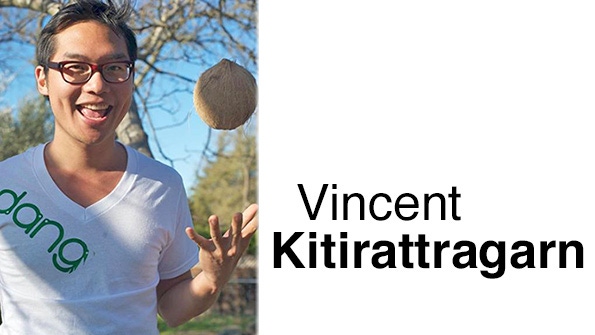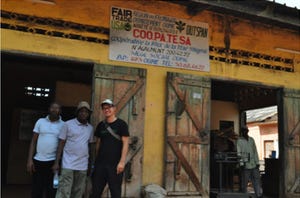With the Ebola outbreak, going to West Africa right now might seem crazy. But I did it anyway to learn more about what fair-trade sourcing really means.

Flanked by a planeload of Chinese businesspeople, this month my partner and I disembarked in Accra, Ghana, for a five-night stay before heading to Abidjan. Because of the Ebola outbreak and it being low season, hotels and flights were relatively empty. Each passenger had his/her temperature screened upon arrival and no passengers who had recently traveled to Liberia, Sierra Leone or Guinea were allowed into the Ivory Coast.
Why go to West Africa right now? Because we wanted to see first hand why fair-trade sourcing matters.
The British colonized Ghana and created a series of forts along the coastline – beautiful in setting yet horrific in nature. Each fort served as a layover for slaves en route to the Americas. The small holding cells were extremely dark, poorly ventilated and way too small for the amount of people they held. The stone flooring was covered in a thick layer of decomposed human waste since the slaves had no choice but to sit and sleep in it. The forts serve as a reminder of a past time when slavery was out in the open, to contrast with the economic slavery some farmers and factory workers experience today.
West Africa, I learned, is a now hotbed for Chinese investment. The Chinese government provides low-interest loans to companies (mostly state-owned) that handle infrastructure projects and the mining of natural resources. The West African countries typically offer zero or low tariffs, as well a cheap labor to work on transportation and energy projects and in the mines.
What we saw
Our first farm visit came a few hours outside Accra, near Kakum National Park. We met a 50-something gentlemen who led us to his farm and explained to us the hard work it takes to grow cacao. Each tree lasts for several decades, and farmers have to care diligently for the small pods so they don’t get eaten by insects.
 A short plane ride brought us to Abidjan, where we met with Coopatesa, a group of 343 cacao farmers in the region. With the help of an interpreter, the coop supervisors listed the many projects made possible by Fair Trade premium funds, including the purchase of tools, fertilizer and pesticide; educating farmers about production, safety and environmental considerations; and first aid supplies.
A short plane ride brought us to Abidjan, where we met with Coopatesa, a group of 343 cacao farmers in the region. With the help of an interpreter, the coop supervisors listed the many projects made possible by Fair Trade premium funds, including the purchase of tools, fertilizer and pesticide; educating farmers about production, safety and environmental considerations; and first aid supplies.
Our favorite moment came when I asked the farmers if they knew what the cacao were used for. They replied that they didn’t (most farmers earn only $400 per year), and we shared bite-sized pieces of chocolate that we had brought along with us. Their reactions were priceless, ranging from “Tres delicieux” to the French translation of “If you can bring me chocolate every day I will be very happy.”
When asked what message they had for consumers of their chocolate, one expressed his wish for wealthy folks to visit the farms to see how much work is involved, so they can fully appreciate what goes into the chocolate they buy.
Fair trade opportunities
My main takeaway is that Fair Trade and cooperatives help improve farming conditions and allow the farming community to grow steadily and sustainably. However, with such a lengthy supply chain (farmer-coop-exporter-processor-manufacturer-brand-distributor-retailer-consumer), I see opportunities for chocolate brands to adopt a small-batch coffee model and buy directly from farmer groups, giving them a higher price than they would otherwise earn.
The large chocolate companies may have a vested interest in retaining the status quo, but I see plenty of space for small disruptive brands to create new efficiencies and bypass many of the links in the aforementioned supply chain. Doing so will not only pay farmers more, but make the world a smaller place by decreasing the steps from farm to plate.

What is fair-trade worth?
Would you venture into West Africa?
About the Author(s)
You May Also Like




